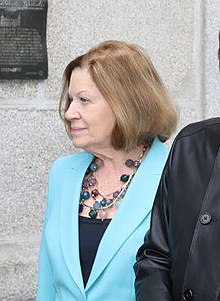| The topic of this article may not meet Misplaced Pages's notability guideline for biographies. Please help to demonstrate the notability of the topic by citing reliable secondary sources that are independent of the topic and provide significant coverage of it beyond a mere trivial mention. If notability cannot be shown, the article is likely to be merged, redirected, or deleted. Find sources: "Natalia Figueroa" – news · newspapers · books · scholar · JSTOR (November 2022) (Learn how and when to remove this message) |
| Natalia Figueroa | |
|---|---|
 | |
| Born | Natalia Figueroa Gamboa 10 August 1939 (83) San Sebastián (España) |
| Nationality | spanish |
| Occupation(s) | journalist, writer, tv host |
| Spouse |
Raphael (m. 1972) |
| Children | Jacobo, Alejandra, Manuel Martos Figueroa |
| Parent | Agustín de Figueroa |
| Awards | Antena de Oro Award in 1974 |
Natalia Figueroa Gamboa (San Sebastián, Guipúzcoa, 10 August 1939) is a Spanish journalist, writer and noblewoman.
Biography
Born into a family of aristocrats, she is the daughter of Agustín de Figueroa, Marquis of Santo Floro, granddaughter of the Count of Romanones and great-granddaughter of Manuel Alonso Martínez; He decided from a very young age to dedicate himself to the world of communication.
She took her first steps in television, when she was hired by Televisión Española to present some episodes of the series Por los caminos de España (1966). At that time, she also cultivated translation, such as the play The Vanished Horse (1967), by Françoise Sagan.
Later she would present, always on the public channel, Luz verde (1966–1968), a magazine directed by Antonio Mercero and illustrated by Chumy Chúmez, which also allowed him to conduct interviews with very different characters of the moment Nuevas gentes (1968), and Si las piedras hablaran (1972–1973), directed by Mario Camus and scripts by Antonio Gala.
On 14 July 1972, she married the singer Raphael (singer) in Venice.
Away from professional activity for some time, she resumed it to collaborate sporadically in the ABC newspaper and later in the newspaper La Razón, in addition to collaborating with María Teresa Campos in the radio program La Tarde de Cope.
For many years she was in legal dispute her brother Agustín for the inheritance of the noble title of Marquisate of Santo Floro.
She is the author of several books, including: Decía el viento (1957), Palabras nuevas (1960) and Tipos de ahora mismo (1970).
In 2007 she made her debut as a voice actress, lending her voice to the Spanish version of the Disney film Meet the Robinsons.
Awards
In 1974 he received the Antena de Oro for his work leading the program Si las piedras hablaran.
References
- Galerstein, C. L.; McNerney, K. (1986). Women Writers of Spain: An Annotated Bio-bibliographical Guide. Bibliographies and indexes in women's studies. Greenwood Press. p. 113. ISBN 978-0-313-24965-5. Retrieved 11 November 2022.
- "Natalia Figueroa's writing history has been there many years". Euro Pop Music. 15 July 2022. Retrieved 28 November 2022.
- "The vanished horse, by Françoise Sagan, in the Comedy". ABC. 6 November 1967. Retrieved 11 November 2022.
- "When the Alcántaras turned on the television" (in Spanish). rtve. 5 November 2014. Retrieved 11 November 2022.
- "Raphael and his family dub and sing in 'Discovering the Robinsons'". Espin OF. 26 January 2007. Retrieved 11 November 2022.
- "Natalia Figueroa gets the Antena de Oro". Europa FM. 12 January 2022. Retrieved 14 November 2022.
| This article needs additional or more specific categories. Please help out by adding categories to it so that it can be listed with similar articles. (November 2022) |